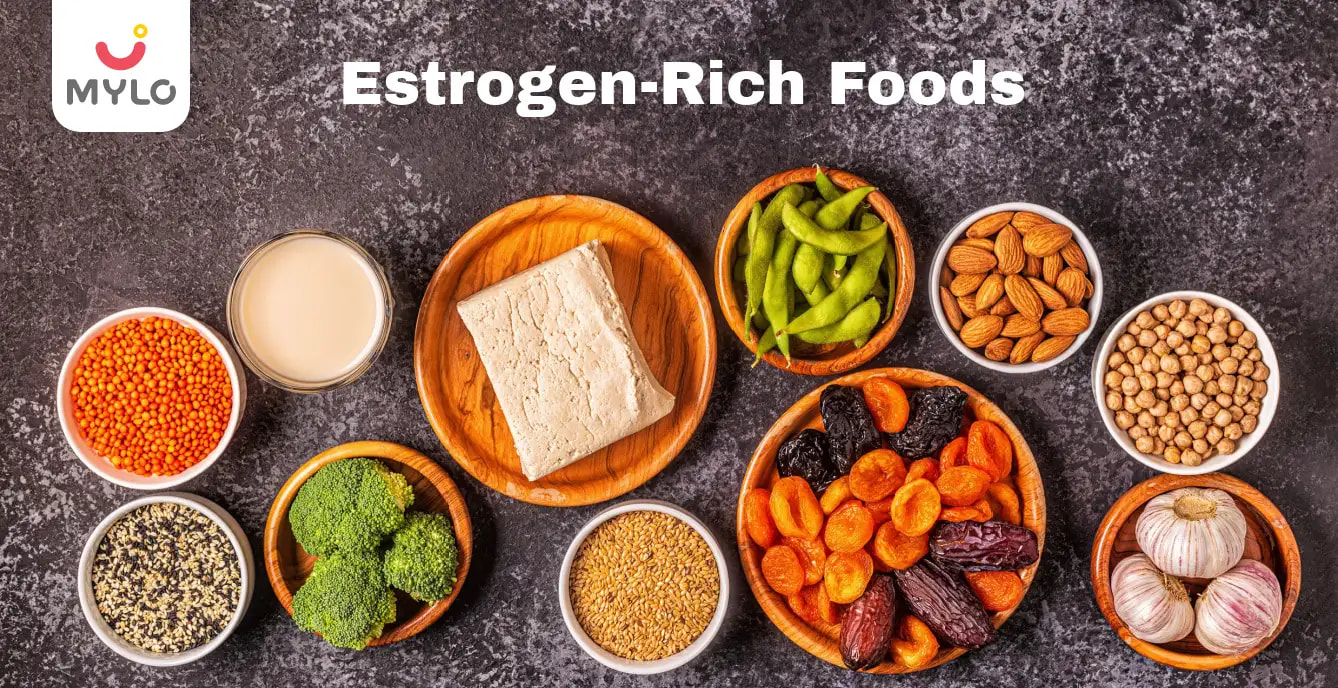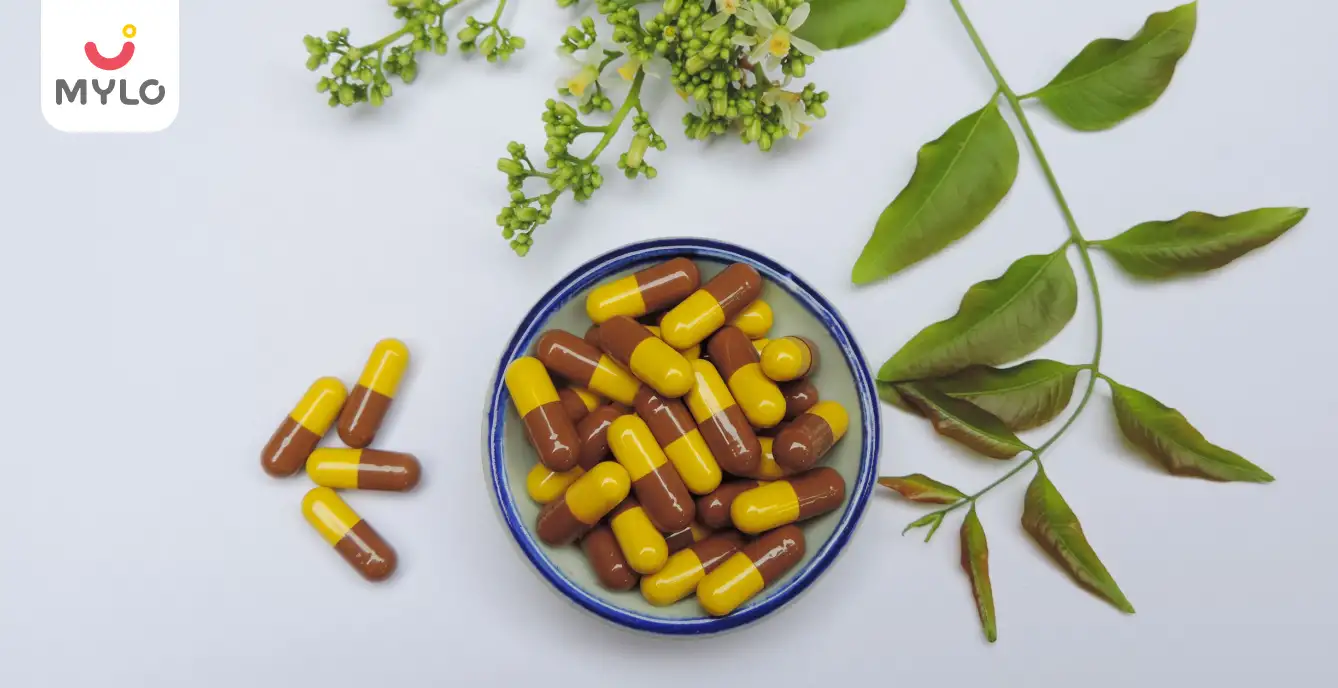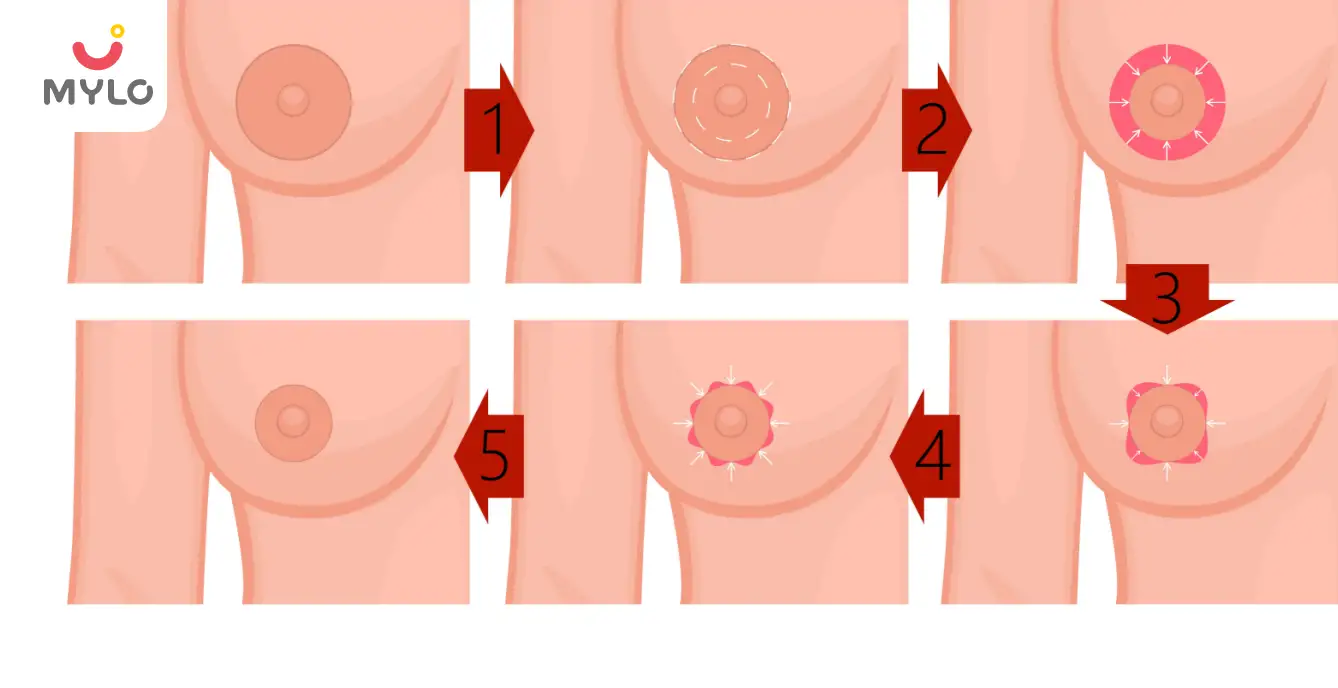Home

Women Specific Issues

The Ultimate Guide to Estrogen-Rich Foods and Their Benefits
In this Article

Women Specific Issues
The Ultimate Guide to Estrogen-Rich Foods and Their Benefits
Updated on 25 October 2023
Estrogen, a vital hormone in the human body, plays a significant role in various aspects of health and well-being, especially for females. While it's commonly associated with reproductive functions, estrogen influences much more than that. In this comprehensive guide, we will explore the world of estrogen-rich foods, the reasons why you should consider consuming them, and the potential risks associated with altering your estrogen levels through your diet.
Why Should You Consume Foods High in Estrogen?
Estrogen-boosting foods offer numerous health benefits, making them a valuable addition to your diet. Here are five compelling reasons why you should consider consuming estrogen foods:
1. Hormone Balance
Estrogen plays a key role in hormone balance, helping regulate the menstrual cycle and reduce the risk of hormonal imbalances.
2. Bone Health
Estrogen is essential for maintaining bone density, which can help prevent conditions like osteoporosis.
3. Heart Health
Estrogen supports heart health by promoting healthy cholesterol levels and blood vessel function.
4. Cognitive Function
Estrogen is believed to have a positive impact on cognitive function and memory, particularly in postmenopausal women.
5. Skin and Hair Health
Estrogen contributes to maintaining skin elasticity and hydration while promoting hair health and growth.
10 Estrogen-Rich Foods
Incorporating foods that increase estrogen levels in females into your diet is a natural way to support your health and well-being. Here are ten foods that can help increase your estrogen levels:
1. Flaxseeds
Flaxseeds are an excellent source of lignans, which have estrogen-like effects in the body.
2. Soy Products
Soy foods, such as tofu, tempeh, and edamame, are rich in phytoestrogens, which mimic the effects of estrogen.
3. Chickpeas
Chickpeas are high in plant-based estrogens and can be used in various recipes.
4. Lentils
Lentils are another legume that contains phytoestrogens and offers a range of health benefits.
5. Dried Fruits
Dried fruits like apricots, dates, and prunes contain moderate levels of phytoestrogens.
6. Sesame Seeds
Sesame seeds are a good source of lignans, which can boost estrogen levels.
7. Whole Grains
Foods like oats, barley, and wheat are rich in lignans and fiber, which promote estrogen balance.
8. Berries
Berries such as strawberries and cranberries contain phytoestrogens and offer antioxidant benefits.
9. Garlic
Garlic contains allicin, a compound that can help regulate estrogen levels in the body.
10. Red Clover
Red clover is an herb with a long history of use in traditional medicine for its estrogen-like effects.
What are the Potential Risks of Consuming Foods That Increase Estrogen?
While the benefits of estrogen-boosting foods are noteworthy, it's essential to be aware of potential risks associated with altering estrogen levels through your diet. Here are five potential risks to consider:
1. Hormone Imbalance
Consuming large amounts of estrogen foods may lead to hormonal imbalances, potentially causing irregular menstrual cycles or other health issues.
2. Estrogen Dominance
An excess of estrogen in the body can lead to estrogen dominance, which may result in symptoms like breast tenderness, mood swings, or weight gain.
3. Allergic Reactions
Some individuals may be allergic to certain foods high in estrogen, leading to adverse reactions.
4. Interactions with Medications
Foods that increase estrogen levels in females may interact with medications or hormonal therapies, affecting their effectiveness.
5. Health Conditions
If you have specific health conditions or a history of hormone-related disorders, it's crucial to consult a healthcare provider before significantly altering your diet.
You may also like: What Helps in Improving Mental Health of Women
Tips to Follow While Consuming Estrogen-Boosting Foods
To safely and effectively incorporate estrogen foods into your diet, consider the following tips:
1. Balance is Key
Aim for a balanced diet that includes a variety of estrogen foods to avoid overconsumption.
2. Consult a Healthcare Provider
If you have concerns about hormone levels or specific health conditions, seek guidance from a healthcare provider before making significant dietary changes.
3. Monitor Your Body
Pay attention to your body's response to dietary changes. If you notice adverse effects, consult a healthcare professional.
4. Choose Organic
When possible, choose organic sources of foods that increase estrogen to minimize exposure to pesticides and other chemicals.
5. Combine with a Healthy Lifestyle
Incorporate foods that increase estrogen levels in females into a healthy lifestyle that includes regular physical activity, a balanced diet, and stress management.
Final Thoughts
Estrogen-rich foods have the potential to offer valuable health benefits, especially when consumed as part of a balanced diet. However, it's essential to approach dietary changes with awareness and caution, as significant alterations to hormone levels can have both positive and negative effects on your well-being. If you're considering a shift towards estrogen-boosting foods, consult a healthcare provider to ensure that your choices align with your specific health needs and goals.
References
1. Desmawati D, Sulastri D. (2019). Phytoestrogens and Their Health Effect. Open Access Maced J Med Sci.
2. Patisaul HB, Jefferson W. (2010). The pros and cons of phytoestrogens. Front Neuroendocrinol.



Written by
Anupama Chadha
Anupama Chadha, born and raised in Delhi is a content writer who has written extensively for industries such as HR, Healthcare, Finance, Retail and Tech.
Read MoreGet baby's diet chart, and growth tips

Related Articles
Related Questions
Hello frnds..still no pain...doctor said head fix nhi hua hai..bt vagina me pain hai aur back pain bhi... anyone having same issues??

Kon kon c chije aisi hai jo pregnancy mei gas acidity jalan karti hain... Koi btayega plz bcz mujhe aksar khane ke baad hi samagh aata hai ki is chij se gas acidity jalan ho gyi hai. Please share your knowledge

I am 13 week pregnancy. Anyone having Storione-xt tablet. It better to have morning or night ???

Hlo to be moms....i hv a query...in my 9.5 wk i feel body joint pain like in ankle, knee, wrist, shoulder, toes....pain intensity is high...i cnt sleep....what should i do pls help....cn i cosult my doc.

Influenza and boostrix injection kisiko laga hai kya 8 month pregnancy me and q lagta hai ye plz reply me

RECENTLY PUBLISHED ARTICLES
our most recent articles

Ayurveda & Homeopathy
Ayurvedic Medicine for Erectile Dysfunction: A Guide to Discovering Natural Solutions

Women Specific Issues
Big Areolas: A Comprehensive Guide to Causes, Risks and Treatments

Anaemia
Anemia During Pregnancy: Symptoms, Causes & Management

skin care
The Benefits and Risks of Using Hydrocortisone Cream for Babies

Second Child
The Ultimate Guide to Planning for Second Baby

Illnesses & Infections
The Ultimate Parent's Guide to Dealing with Boils in Babies
- 2 Months Pregnant Belly: Understanding Your Belly and Baby's Transformation
- The Significance of Trilaminar Endometrium in Fertility: What You Need to Know
- Kanchanar Guggulu: Your Ultimate Guide to a Healthy Lifestyle
- First Trimester of Pregnancy
- Top 10 Comedy Movies on Hotstar to Make You Laugh Your Heart Out
- Stages of Pregnancy by Trimester
- Your Streaming Guide to the Best Web Series on Hotstar in Hindi
- Top Romantic Movies on Hotstar That'll Melt Your Heart
- When to Have Another Child: Timing and Tips
- Top 10 Benefits of Triphala: Discover the Hidden Health Secrets
- Ayurvedic Medicine for Irregular Periods: Discovering Ancient Remedies for Hormonal Harmony
- The Link Between Missed Period and White Discharge
- Vata Pitta Kapha: The Ultimate Guide to Discovering Your Ayurvedic Constitution
- Top 10 Romantic Web Series on Hotstar You Must Watch


AWARDS AND RECOGNITION

Mylo wins Forbes D2C Disruptor award

Mylo wins The Economic Times Promising Brands 2022
AS SEEN IN
















- Mylo Care: Effective and science-backed personal care and wellness solutions for a joyful you.
- Mylo Baby: Science-backed, gentle and effective personal care & hygiene range for your little one.
- Mylo Community: Trusted and empathetic community of 10mn+ parents and experts.
Product Categories
baby carrier | baby soap | baby wipes | stretch marks cream | baby cream | baby shampoo | baby massage oil | baby hair oil | stretch marks oil | baby body wash | baby powder | baby lotion | diaper rash cream | newborn diapers | teether | baby kajal | baby diapers | cloth diapers |




